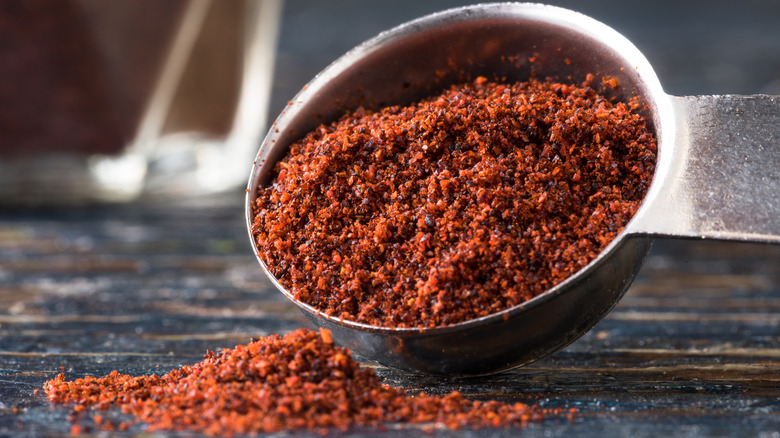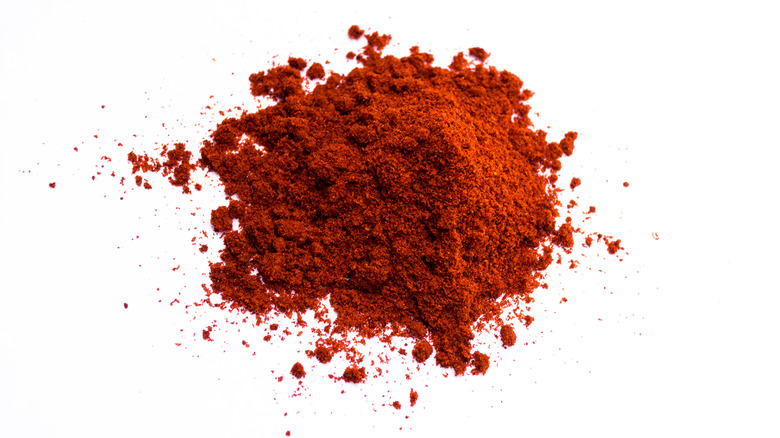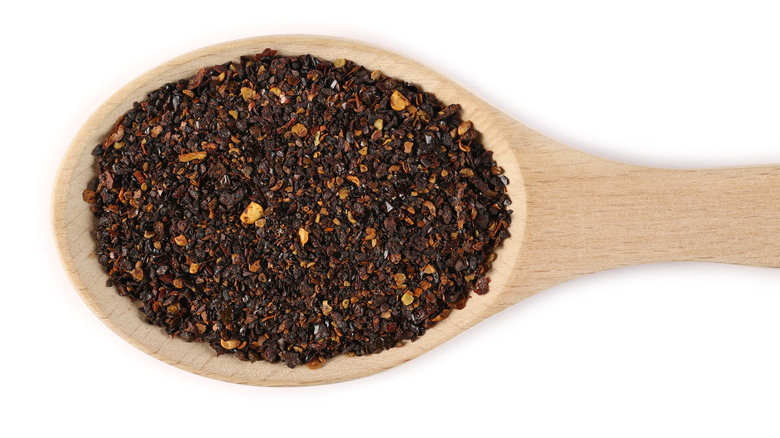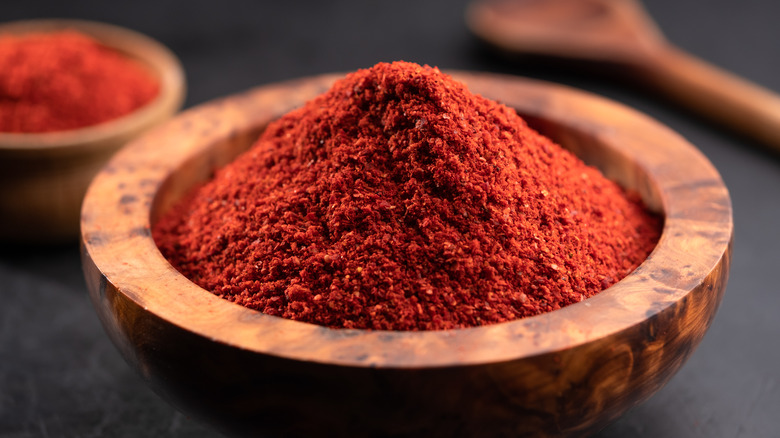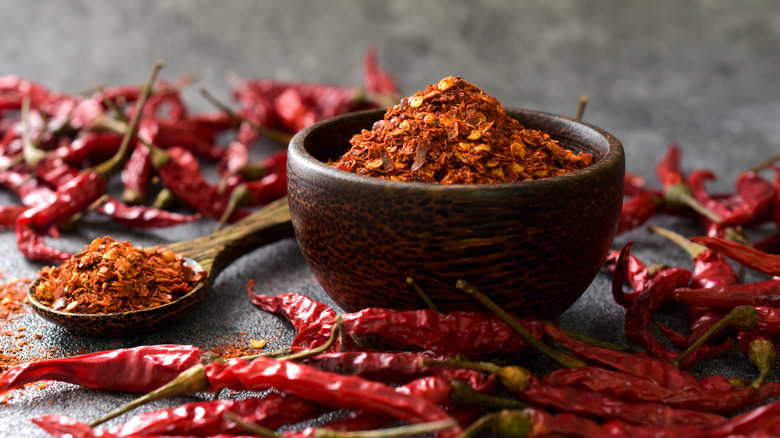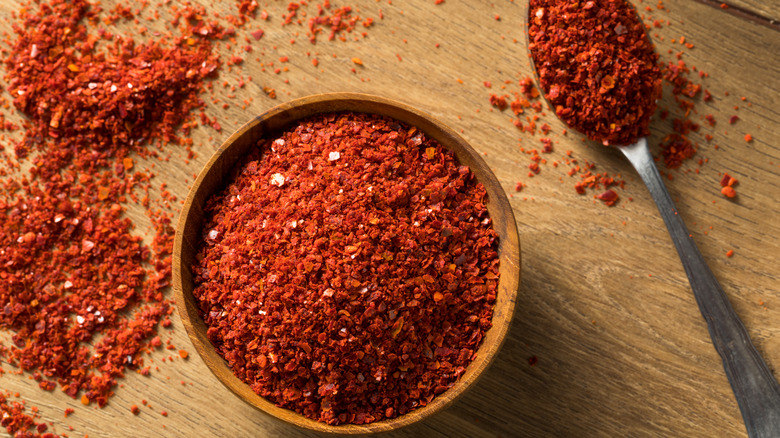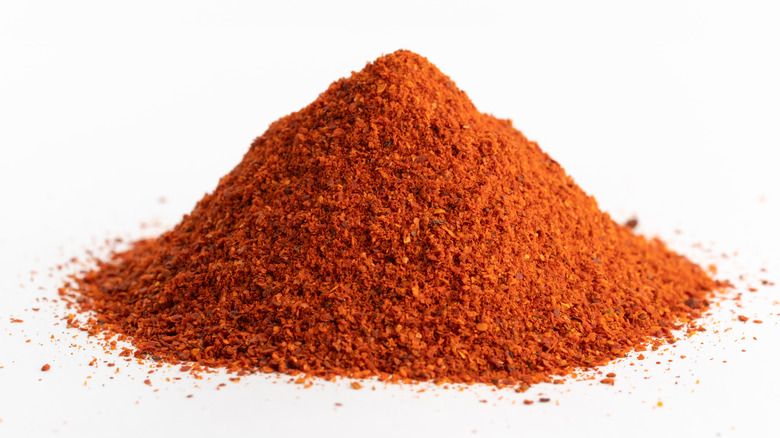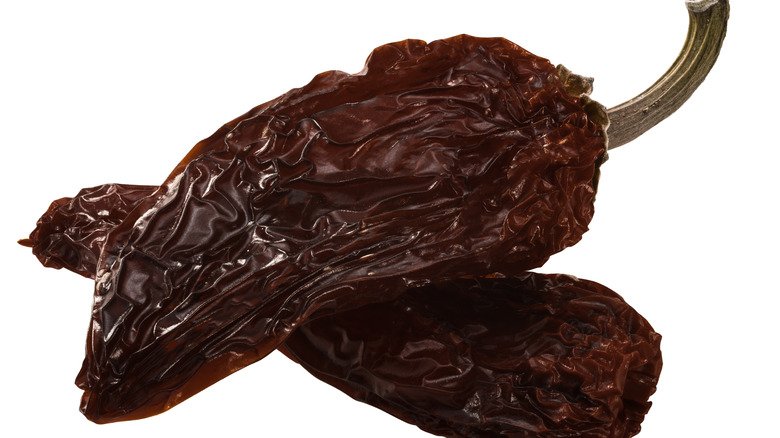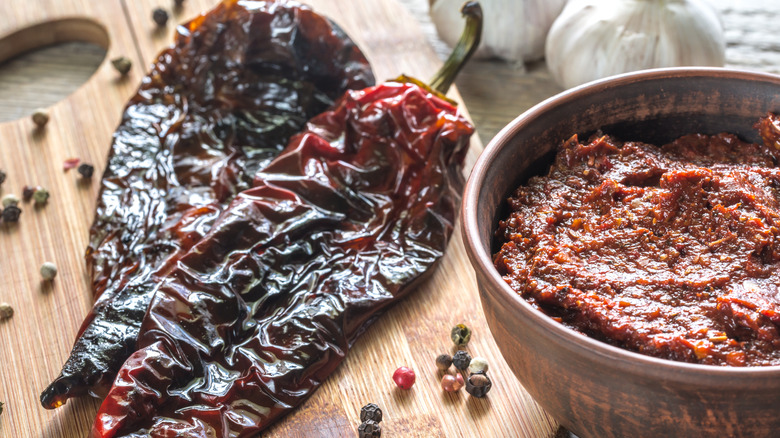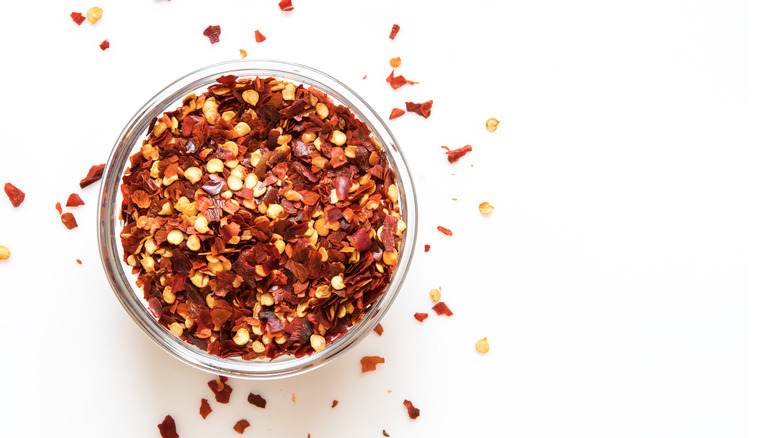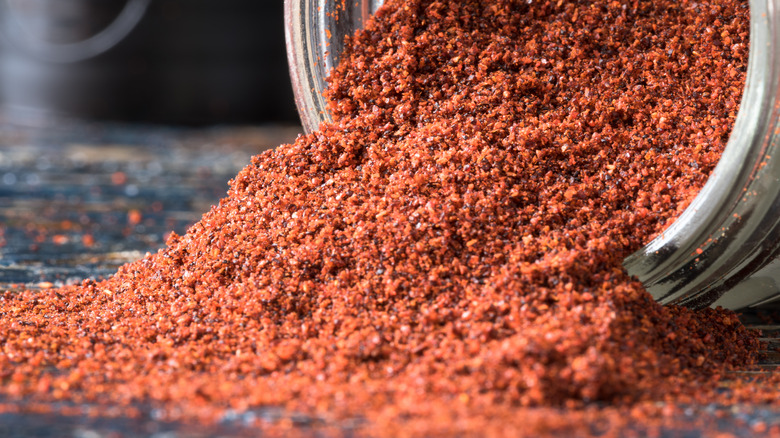10 Best Substitutes For Chipotle Powder
We may receive a commission on purchases made from links.
As all cooks know, spices and seasonings are absolute game changers in the kitchen — they can take a basic dish and elevate it, creating a mouthwatering plate from simple ingredients. Whether you're whipping up an elaborate feast or just making a quick dinner, having a fully stocked spice collection can make a real difference. However, there are times when you simply run out of a certain spice, and don't feel like making a trek to the grocery store (or wherever you purchase your spices) to restock, just to make one dish. That's where substitutions can be helpful.
Chipotle powder has a unique flavor that can be a bit challenging to replicate. It has some heat, as most chili-based spices and seasonings do, but it also has some smoky flavor notes and a bit of earthiness, per Pepper Scale. The complexity of flavor makes it a great addition to your spice collection, and it can transform dishes with just a spoonful of spice — a dash of chipotle powder can turn a small dish of regular mayo into a chipotle aioli perfect for a sandwich or wrap. Whether you're using it as a topping, a dry rub, in a marinade or in a sauce, here are a few substitutions that may serve you well.
Smoked Paprika
If the most important thing to you when crafting your dish is to keep the ease of using a dried spice as well as keep some of those smoky flavor notes, smoked paprika just might be an ideal substitute for you (via Pepper Scale). You'll want to make sure that it is, in fact, smoked paprika, though — the regular and sweet varieties of this powerhouse spice have very different tastes. The smoked paprika will bring those same smoky, earthy elements to your recipe, and the powdered format means the consistency will be the same as well, making this an ideal substitute for dry rubs and seasoning blends. One thing to note is that smoked paprika doesn't actually contain much heat at all — so, if that's an important element in your dish, you may want to also add a bit of your favorite heat-packing spice or hot sauce to deliver that kick. You can use this as a direct substitute, adding a teaspoon of smoked paprika for every teaspoon of chipotle powder your recipe calls for.
Ancho Chili Powder
This dried spice is crafted from Poblano peppers, and has some of those same smoky flavor notes as chipotle powder does, as well as a bit of heat (via Richard Pantry). Ancho chili powder is similar in color to chipotle powder, and is a staple seasoning for Mexican cuisine. The one element to consider here is the heat — while ancho chili powder does have a bit of spice, it's nowhere near as hot as chipotle powder, so you'll want to add a bit more heat with another seasoning if you'd like to match the spice level of the original recipe (via Pepper Scale).
On the other hand, if you find chipotle powder to be a bit on the spicy side, this substitute might even make your recipe more to your liking. Since ancho chili powder is a bit more mild than chipotle powder, you can be a bit more generous in your substitution — for every tablespoon of chipotle powder a recipe calls for, you can swap in about a tablespoon and a half of ancho chili powder, and then adjust according to taste.
Chili Powder
For home cooks who don't feel very comfortable playing around with spices and crafting their own special blends, chili powder might be an ideal substitute for chipotle powder (via Spiceography). Typically, chili powder is a seasoning mix that contains ground chilies as well as a few other spices, such as oregano and cumin. This means that you're not just adding a dose of heat to your recipe with this substitute — you're incorporating some additional flavor, thanks to the various spices within the seasoning mix. Plus, for those looking for the smoky notes found in chipotle powder, check the label that details the particular spices in a certain blend of chili powder — some contain ancho chilies in the mix, which add that smoky quality. For best results, you'll want to make a direct substitution, using a teaspoon of chili powder if your recipe calls for a teaspoon of chipotle powder. And, take a moment to evaluate the dish to determine whether any other seasonings should be adjusted — since chili powder contains a few different spices, you'll want to make sure you're not doubling up with a spice the recipe already calls for, such as adding double the cumin because you forgot the chili powder contained it as well.
Cayenne Powder
If you're all about spicy food, cayenne just might be a worthy substitute for chipotle powder in your recipe. Cayenne has quite a neutral taste, which means it's a versatile substitution — you may have to add additional ingredients to recreate the smoky flavors found in chipotle, but if heat is the main thing chipotle powder is delivering in a recipe, cayenne could be just the ticket. The one thing to be cautious of is the heat level, per MasterClass. To put it into context, while chipotle powder typically has a Scoville scale rating (the measure of heat in chili peppers) of anywhere from 2,500 to 8,000, cayenne clocks in between 30,000 to 50,000 units, according to Savory Spice Shop. That's right — it's triple the heat in some cases, or even more. Due to that change in the heat level, you'll want to be careful about quantity when making this substitution — if a recipe calls for a tablespoon of chipotle powder, you'll want to use only half a tablespoon of cayenne, and then add more if you think the dish needs it.
Gochugaru Powder
Gochugaru is a staple seasoning in Korean cuisine. For those who aren't familiar, you may recognize the ingredient gochujang, a Korean paste that delivers some major flavor and heat, and contains finely ground gochugaru as one of the staple ingredients (via My Korean Kitchen). This spice certainly isn't one you can track down at every grocery store, but if you're a fan of making Asian cuisine and have a well-stocked spice collection, you just might have this one on hand.
Gochugaru powder is crafted from sun-dried chili peppers, and it's a great substitute for chipotle powder because it packs some of that smoky flavor so beloved in chipotle powder (via The Woks of Life), as well as a hint of sweetness to add complexity. Additionally, it has a Scoville scale ranking of about 8,000, which is right on par with chipotle powder — so you're getting roughly the same amount of heat in your recipe (via Richard Pantry). Since gochugaru powder has so many similarities to chipotle powder, you can do a direct substitution — use a teaspoon of gochugaru for every teaspoon of chipotle powder your recipe calls for.
Pasilla Powder
One of the primary flavor notes that makes chipotle powder stand apart from other spicy seasonings is that smoky quality — and that's exactly what makes pasilla powder such a great substitute (via Richard Pantry). This spice has a bit of those smoky flavor notes (although not quite as much as chipotle powder does), and also some fruity flavor notes and a hint of earthiness that can add serious depth to the overall flavor of your dish. It doesn't have quite as much heat, but there's still a bit of kick.
The one downside to pasilla powder is that it isn't quite as readily available as some of the other substitutes, which can be found in most grocery stores. However, if you love to cook authentic Mexican cuisine and have some on hand, or if the supermarket you go to has a robust spice selection, you may be in luck with this substitute. For this particular ingredient, you can do a one to one substitution for best results — if your recipe calls for a tablespoon of chipotle powder, you would use a tablespoon of pasilla powder instead.
Chipotle Peppers
If you're looking to really capture that authentic chipotle flavor in whatever dish you're whipping up, one of the best substitutes is to go to the actual source — given that chipotle powder is crafted from dried, ground chipotle chili peppers, this is a fantastic substitute (via Gourmet Sleuth). The one thing to be aware of with this substitution is obviously the consistency. It can be tough to incorporate full chipotle peppers into something like a rub, no matter how finely you dice them, so this is a substitute that's best in dishes where the added moisture content and texture from the peppers themselves doesn't make a difference. Using actual chipotle peppers would be ideal for something like fajitas or quesadillas, where you can combine the diced peppers with other ingredients and you don't need a silky smooth consistency.
Alternatively, if you want that true chipotle flavor but require a particular consistency, you could always toss the chipotle peppers in a blender or food processor to turn them into more of a puree. For best results when making this substitution, the rule of thumb is that one teaspoon of chipotle powder is equivalent to about one chipotle pepper, although you may want to taste as you go to be safe.
Adobo Sauce
There are some recipes that call for a full can of chipotle peppers in adobo sauce, but often, you only need a small portion of a can for one recipe, leaving you with a bunch of leftover peppers, or perhaps some leftover adobo sauce. Luckily, that's a good problem to have — you can simply freeze portions of the adobo sauce and then it's ready for use whenever you need a burst of that smoky, spicy flavor in your dish. If you're really thinking ahead, you can even blend the remaining chipotle peppers in with the adobo sauce in order to really get all that flavor into your puree (via The Kitchn).
However, even on its own, adobo sauce is packed with all the same flavors that chipotle powder contains, and it can be a great substitute for something like a sauce or dressing where you really need all the components to be smooth when combined. For best results, since you're working with the same base ingredient and the same heat level, you can do a direct swap, using a tablespoon of adobo sauce in place of a tablespoon of chipotle powder in your recipe.
Crushed Red Pepper
If the particular recipe you're trying to make doesn't really need the smoky flavor notes of chipotle powder, but rather just requires a punch of heat, crushed red pepper just might be an ideal substitute (via Greedy Gourmet). You may recognize this particular spice from your local pizzeria, as many Italian spots have small containers of this available for guests who want to spice up their meal. The mixture contains small flecks in a variety of colors, from vibrant red to a dark purplish-red, to pale yellow — that's because crushed red pepper is generally a mix of a few different types of peppers. This mixture also gives the blend a bit of complexity, so you're getting a little something beyond just the heat in your final dish.
This substitute is particularly well suited for a dish where you want to sprinkle it on for garnish or at the end — the larger flakes mean it's a bit easier to distribute than shaking finely ground spices over a salad or pasta dish. For best results, this is a direct swap, and you can use a teaspoon of crushed red pepper for every teaspoon of chipotle powder your recipe calls for.
DIY Chipotle Powder
If you have a bit of time to spare and also possess a spice grinder you can use, one fantastic option is to simply make your own DIY chipotle powder by blending up dried chipotle peppers (via Chili Pepper Madness). In order to get the right consistency, you may need to sift through the ground mixture to ensure there aren't any large chunks or pulpy interior material, but it's a fairly simple process. While you could certainly just use the ground chipotle peppers on their own, if you really want to take your dish to the next level, you can try to incorporate a few additional spices such as smoked paprika, cumin, and garlic powder, in order to really get a spice blend with a complex flavor. For best results, you can do a direct swap with this substitution, using a tablespoon of your DIY chipotle powder if your recipe called for a tablespoon of regular chipotle powder.
